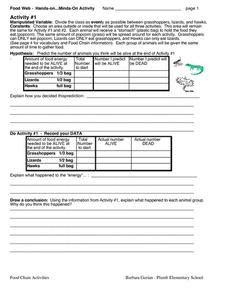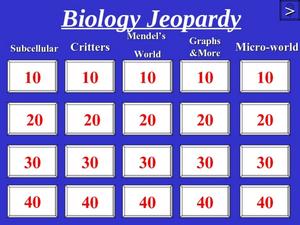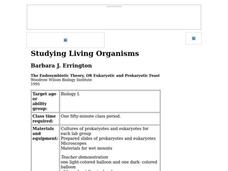Curated OER
Regents High School Examination: Living Environment 2003
The living environment, from the interior of a cell to the complex relationships among populations, are queried in this final examination. Learners look at air pollution maps, diagrams of cells, population graphs, and drawing of cells....
Curated OER
Regents High School Examination: Living Environment 2005
The 2005 version of the Regents High School Examination in the area of ecology is as comprehensive as previous years' exams. It consists of 40 multiple choice questions on everything from the structure of DNA to the interactions within...
Curated OER
Regents High School Exam: Living Environment 2008
Tne New York Regents High School Examinations are comprehensive and include various styles of questions, includingmultiple choice and the analysis of graphs. This particular version, the 2008 Living Environment exam surveys a variety of...
Biology Junction
Photosynthesis: Energy and Life
All life requires energy ... and the connection between energy and plant life typically requires photosynthesis. Scholars explore photosynthesis in depth from ATP/ADP through the Calvin cycle. A helpful presentation highlights concepts...
Science 4 Inquiry
The Classification of Living Things
It's a classification sensation! Demystify why we classify using an inquiry activity that helps your class sort things out. Groups begin by classifying a variety of shoes before they research organisms and design their own dichotomous...
Curated OER
Food Chain Activities
Transform young biologists into grasshoppers, lizards, and hawks as you teach them about food chains in an interactive life science simulation. Working collaboratively to act out three different scenarios involving these creatures,...
Gallantsbiocorner.com
The Cell
Help young biologists piece together an understanding of cell structure with a comprehensive review worksheet. Tasking students with describing the function of the organelles found in cells and their relationship with one another, this...
Kentucky School for the Deaf
Levels of Organization within an Ecosystem
From tiny organisms to entire biomes, young scientists examine the interdependent relationships tying all living and non-living things together with this collection of ecology resources.
Teacher Web
Archaebacteria and Eubacteria
Take young biologists back to the beginning of life on Earth with this presentation on bacteria. Examining the different classifications of bacteria, this presentation introduces young scientists to the concepts of autotrophs and...
Curated OER
Cell Respiration Worksheet
Beginning biologists demonstrate their grasp on cellular respiration, photosynthesis, and energy flow though ecosystems when completing this worksheet. Fifteen multiple choice and short answer questions test their knowledge. Because of...
Curated OER
Biology Jeopardy
Play Jeopardy as you review what might possibly be an entire year's high school biology course! The vast variety of questions requires that you read through the slides to make sure that they all relate to your curriculum. You could make...
Curated OER
Cycling of Matter and Energy
These twenty various types of questions related to the cycling of matter and energy require students to match each definition in column 1 with the correct vocabulary term from column 2. Then, students explain what is being demonstrated...
Curated OER
What's the Difference?
Young scholars analyze the similarities in different species. This instructional activity is part of a multi-segmented unit on the diversity of life. In this segment, students classify shoes to mimic the scientific categories of the...
Curated OER
The Biosphere
In this biosphere worksheet, students identify the different levels of organization that ecologists study. Students complete charts, sentences, and answer short answer questions.
Curated OER
Importance of Digestion
In this digestion worksheet, students complete statements using researched information about digestion and the digestive system. Students also sketch several figures that relate to digestion.
Curated OER
Cellular Respiration and Photosynthesis
In this cellular respiration and photosynthesis worksheet, students read through the presented material and draw an illustration of the production of ATP. Students answer several short answer questions about the production of ATP,...
Curated OER
Nutrition and Energy Flow
In this energy flow worksheet, students will complete 10 short answer questions based on a food web diagram. Then students will review different cycles in nature including the water cycle, carbon cycle, and energy cycle. This worksheet...
Curated OER
Studying Living Organisms
Students are introduced to Hardy-Weinberg Equilibrium without recourse to algebra. After participating in this activity, students gain a feeling for the significance of the Hardy-Weinberg Equilibrium without using algebra.
Curated OER
Diversity of Life
Students explore the diversity of life forms and the role that interdependency plays in our world through a mult-segmented unit. This segment introduces the unit.
Curated OER
Goals of the Diversity of Life Unit
Students are introduced to the unit on the importance of diversity of life and the role that interdependence plays in our worlds. this is part of a multi-lesson unit on the diversity of life.
Curated OER
What is Diversity of Life?
Students are introduced to the variety of organisms in our world. this lesson is a part of a multi-segmented unit on specie diversity. this segment explores distribution of life on land and sea.
Curated OER
Kingdom Animalia
Students are introduced to the basic characteristics of the animal kingdom. this activity is part of a multi-segmented unit on the diversity of life. In this segment, students explore the the members of a few phyla of the animal kingdom.
Curated OER
Tackling Taxonomy
Students study physical characteristics of separate phyla and place them into similar groups. This lesson is part of a multi-segmented unit on the diversity of life. students develop a classification system by grouping animals into...
Curated OER
Creative Classification
Students create an animal by using physical characteristics to classify that animal in the Linnaean Classification System. This lesson is part of a multi-segmented unit on the diversity of life.

























